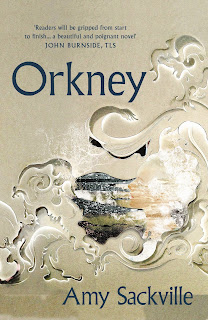
You could imagine a particular kind writing workshop. There's an assignment: sketch out a story set on an island. Have two main characters, and a small cast of locals. The main characters go to the island, some events unfold and then they return to the mainland. End of story. It doesn't seem like much, but there's still plenty of possibility. Amy Sackville's novel Orkney and Audrey Magee's The Colony are both framed in this way, but pull in very different directions, as if to illustrate this possibility. Orkney is a tale of enchantment and loss - inward, psychologically oriented; The Colony a set piece on cultural dominance and exploitation, outward-looking, political. But first, more on similarities. Both stories are set on remote islands of what might be called the Celtic fringe of Europe. Orkney, as its title suggests is set on a Scottish island - probably Westray, whereas Magee's island is somewhere off the Irish coast. Both contain lyrical descriptions of the island seascapes in ways that thicken the narrative. Magee has one of her characters scramble 'on hands and knees along the cliff's edge to peer at caves and archways cut by the ocean' whereas Sackville's studies the 'flats and crevices between the ridges', which are 'strewn with snake-like seaweed'. And both have epigraph's by clever people that signal their orientation: Nietzsche for Magee and Cixous for Sackville. The narrator of Orkney is a professor on the brink retirement, but the island of his experience is refracted through the mysterious, almost mythical presence of his young wife and former student. The Colony dwells most consistently on the character of Mr Lloyd, the artist. Although we repeatedly see the island through Mr Lloyd's eyes there are a number of disrupting devices at work; the character JP, a French linguist studying the island variety of the Irish language, several of the islanders themselves, and the brief almost journalistic accounts of the Troubles - or to be more precise, the deaths of ordinary people caught up in sectarian violence, and these accounts are interspersed with the narrative. The plot of Orkney has none of this structural complexity, it dwells on the slightly uncomfortable Lolita-ish relationship between Richard the professor and his lover, it draws us in like an obsession or an addiction. We are hypnotised, we are enchanted, just like Richard, as slowly his young lover dissolves into pure myth. She - and we never learn her name - she seems to slowly escape his grasp, to fade away, until she finally disappears. Readers are left with the enigmatic sense of Richard's young wife and the character of Richard himself, aloof, misanthropic, obsessional, not particularly attractive, but at the end of his tether, 'I am a cancelled man. I cannot see what I should do with the days ahead; I cannot see tomorrow morning even.' It is as if he is about to be erased, too.
Reading The Colony straight after Orkney is one thing. But I wonder what it might be like to do it the other way round? Would it force a different set of comparisons? Or are they just very different kinds of writing, with different purposes, different preoccupations? I would prefer it that way, but reading both, so close together, made me wonder about the attraction of what might be thought of as remote island fiction. There are plenty of examples of it, and they're not all recent. Perhaps it's simply that a specific and circumscribed setting helps to sharpen a writer's focus. But it also seems that the symbolic separation from the mainland that the island motif provides actually offers us new perspectives on the mainland itself. The poetic, the lyrical Orkney could be read as a critique of our dull, grey conformity, the ways in which we can be trapped (is that what Richard really stands for?). The island is nothing if not beautiful, haunting and dangerous, whereas Richard's life before the island is...well, boring. Standing on The Colony we see a mainland that is deeply marked by political domination and struggle in ways that also play out in social, cultural and linguistic worlds. In Sackville, Orkney can safely remain a placemarker for the romantic imagination and folklore (that's hopeful), but Magee's island exists in a dynamic relationship with the mainland. What will become of the language, of the lives of the islanders, their creative and economic ambitions? It is a different story and it poses different sorts of questions.
